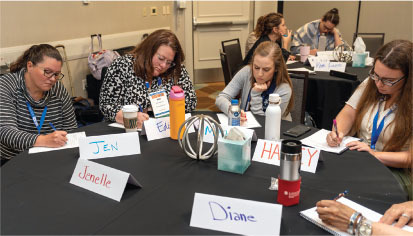July/August 2018
Leading Insight
Leadership Lessons in the Heart of Texas
BY KYLE LeBLANC, P.E.
 Deep in the heart of Texas is one of the state’s many engineering marvels—the Buchanan Dam. Stretching for more than two miles, the Buchanan Dam is considered the largest multiarch dam in the world. Near this inspirational backdrop, members of the Texas Society of Professional Engineers are learning about leadership through the PE Leadership Institute.
Deep in the heart of Texas is one of the state’s many engineering marvels—the Buchanan Dam. Stretching for more than two miles, the Buchanan Dam is considered the largest multiarch dam in the world. Near this inspirational backdrop, members of the Texas Society of Professional Engineers are learning about leadership through the PE Leadership Institute.
Since its inception in 2011, PELI has helped more than 120 graduates with this intensive, eight-month program. Trish Smith, TSPE’s executive director who was a catalyst for establishing PELI, says, “We were not offering specific training for leadership even though we believed there were paths to achieving leadership skills through TSPE. After several years of research and proposals, we developed PELI, and we believe it has become our leading and most valued program.”
I had the privilege of experiencing PELI through my participation in the sixth installment, which took place between November 2016 and June 2017. Through this program, I learned about three required components of leadership: ownership, continuous learning, and support.
Leadership Requires Ownership
PELI is built around taking ownership at a personal level. The first class focused on the actions required to take ownership in your professional life. Each class culminated in sharing this plan of action with peers and a commitment to report back the following session. My personal commitment was to dedicate 30 minutes for personal reflection each week on lessons learned and how this fit with the bigger picture of the work I was doing. This moment of reflection is a practice I am committed to and exercise regularly, more than a year after the class finished.
Each subsequent PELI session built off the prior class in a methodical way, all focusing on ownership and making a difference from your position in your company. The time between each class (about a month and a half) allowed for thoughts and ideas to marinate and for us to then put them into action.
Leadership Requires Continuous Learning
In today’s fast-paced social-media world, where we are constantly tethered to our smart devices, we are conditioned for instant gratification. We tend to assume that this method of instantaneous information can also apply to our pursuit of leadership learning. While principles and best practices of leadership and management can be communicated over a lunch break, leaders will not develop over a brown bag “lunch-and-learn.” Through my experiences in PELI and over the course of my career, I have learned that becoming a leader is a continuous learning process that involves time and commitment. While leadership training of any kind can certainly prove beneficial, I believe that engagement over a longer term provides a more lasting benefit. When the elements of leadership that are learned over a period are applied to one’s circumstances, then “the lightbulb moment” happens. For me, this moment came when I realized that taking initiative and advocating for personal improvement required ownership of my own career and goals.
Leadership Requires Support
 Finally, learning leadership is not a one-man show. Without the support of a mentor or supervisors within the organization, the path to learning leadership is a difficult journey. Supervisors, companies, and the individual alike should seek leadership training opportunities that require a commitment from all parties.
Finally, learning leadership is not a one-man show. Without the support of a mentor or supervisors within the organization, the path to learning leadership is a difficult journey. Supervisors, companies, and the individual alike should seek leadership training opportunities that require a commitment from all parties.
PELI is structured in a way that requires time and financial commitments from the individual and the organization. Commitment statements are needed from the supervisor and the individual pledging support to the endeavor. In addition to the financial commitment, participation in the sessions required engagement Thursday through Saturday as well as time off from work. I am grateful for the support and opportunity provided by my firm and supervisor, who personally advocated for my participation. Many who send a participant to PELI do so year after year because of the noticeable change that the individual brings back to the organization.
The firsthand experience I gained from PELI and the insight provided by course leaders have been invaluable both from a motivational and a personal ownership standpoint. The course helped me to articulate and take action on efforts to enhance my career and provide meaningful contributions to my employer. As an example, following PELI, I committed to a year-long engagement with coworkers to improve the results of our annual performance excellence review program. We scheduled monthly meetings to discuss individual performance goals and held each other accountable to achieve them. This effort went so well that my coworkers are committed to continuing this program for another year.
The engineering profession needs strong leaders. My hope is that other engineers across the nation will seek leadership training like TSPE’s PELI and that other state chapters make a similar commitment to their members in offering robust leadership training.
NSPE member Kyle LeBlanc, P.E., CFM, LEED GA, is a project manager at Lockwood, Andrews & Newnam Inc., a national planning, engineering, and program management firm. He has served in many of the leadership roles in the Brazos Chapter of TSPE and can be reached at [email protected].


 Volunteering at NSPE is a great opportunity to grow your professional network and connect with other leaders in the field.
Volunteering at NSPE is a great opportunity to grow your professional network and connect with other leaders in the field. The National Society of Professional Engineers (NSPE) encourages you to explore the resources to cast your vote on election day:
The National Society of Professional Engineers (NSPE) encourages you to explore the resources to cast your vote on election day:




